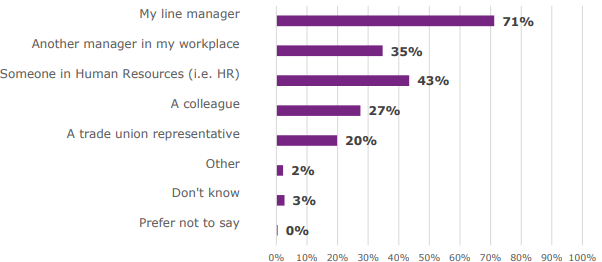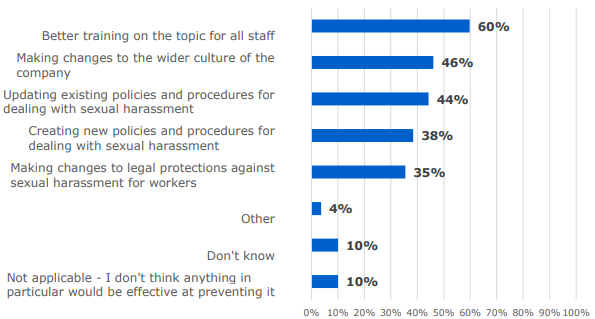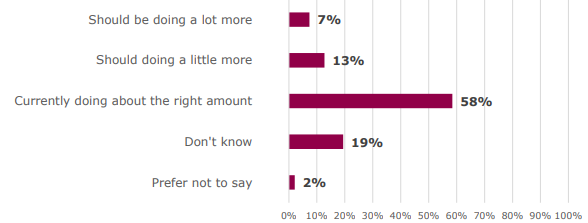Disclaimer
This policy paper was written by Simone Cheng and Adrian Wakeling from the Acas Workplace Policy team. Views are the authors' own and do not necessarily reflect those of the Acas Council.
This paper is not intended as guidance from Acas about how to apply the law in relation to sexual harassment nor as an endorsement by Acas of practices to be adopted in the workplace.
Introduction
It's been a year since the allegations involving Harvey Weinstein revived the #MeToo movement. In this year the reporting of high-profile incidents of sexual harassment has been almost relentless. But has the ongoing debate changed what's going on in British workplaces?
In September 2018, Acas commissioned a YouGov poll to find out if the media outcry has begun to shift organisational culture and if good words are translating into effective action. The results raise some interesting questions.
92% of people in our poll said that they know sexual harassment is unlawful in all workplaces in the UK. But if it is unlawful, why is it still happening?
Key findings
- 30% of adults in Great Britain think that workplace sexual harassment has decreased in the last 5 years.
- 38% of workers said that they would be "very likely" to report sexual harassment if they personally experienced it in their workplace.
- 71% of workers who said that they would be likely to report sexual harassment if they experienced it said that they would feel comfortable reporting it to their line manager.
- 35% of adults in Great Britain think that changes to legal protections against sexual harassment for workers would be effective at reducing it in the workplace.
- 60% of adults think that better training for all staff on the topic of sexual harassment would be effective at reducing it in the workplace.
- 58% of workers believe that their current employer is doing about the right amount to reduce sexual harassment in their workplace.
Analysis
The statistics on prevalence are compelling: earlier this year, Prospect found that more than a third (35%) of women had experienced sexual harassment at work.
Another survey by Slater and Gordon revealed a similar figure (37%) of women who had been sexually harassed at work in the last 12 months. The list goes on.
Offering some insight into the past, a survey by the BBC (2017) found that 4 in 10 (42%) of those over the age of 55 agreed that "looking back over my working life, I have witnessed behaviour that I now believe to constitute sexual harassment but didn't think it at the time".
A lack of awareness may provide a partial explanation as to why, for many, sexual harassment appeared to come out of nowhere. Or perhaps it was so familiar it did not seem wrong?
Only a third (30%) of our survey respondents believe that incidents of sexual harassment in workplaces have decreased in the last 5 years. The same percentage (30%) think that they have stayed about the same, and about one tenth (12%) think that they have increased.
And despite #MeToo, #TimesUp and #WhyIDidntReport, only 24% agree that the international media coverage has helped to improve their workplace culture.
Do such figures suggest that sexual harassment is still as accepted as a cultural norm? And how does this impact on individuals' willingness to speak up?
Only 36% of workers said that they would be "very likely" to report incidents of sexual harassment if they witnessed them in their workplace, with a further 33% stating that they would be "fairly likely" to. The figures rise to 38% and 28% for incidents if they personally experienced them.
And this culture of silence may be more deep-rooted for men, with fewer declaring they would be "very likely" to report incidents they personally experienced (32% for men and 44% for women).
In July 2018, the Women and Equalities Committee highlighted "a lack of awareness at the most senior levels of employers about the extent of sexual harassment in their organisations", but the Acas poll shows that line managers are still seen as the all-important gateway to disclosure and the reporting of incidents.
71% of those who would be likely to report an incident of sexual harassment if they experienced it, said that they would feel comfortable reporting it to their line manager.
Which, if any, of the following people would you feel comfortable reporting it to?

| Option |
Would feel comfortable reporting it to this person |
|---|---|
| My line manager | 71% |
| Another manager in my workplace | 35% |
| Someone in HR | 43% |
| Colleague | 27% |
| Trade union representative | 20% |
| Other | 2% |
| Do not know | 3% |
| Prefer not to say | 0% |
However, this degree of comfort around the person to disclose to 'if' it happens is slightly at odds with wider research about why workers do not report and their perception of what actually happens after incidents are reported.
The Equality and Human Rights Commission (EHRC) 2018 report Turning the tables, Ending sexual harassment at work (PDF, 382KB, 22 pages), for example, found that approximately half of respondents had not reported the harassment to anyone at work due to fears of victimisation and the belief that senior colleagues were "untouchable".
Such findings are further supported by the Trades Union Congress (TUC) and Everyday Sexism Project (PDF, 357KB, 34 pages) in 2016, who found that nearly three-quarters of those who did complain "reported that there was no change and 16% reported that they were treated worse as a result". And an Employment Lawyers Association (ELA) report (PDF, 297KB, 19 pages) in 2018 confirmed that the "risk of retaliation . . . is something that employment lawyers will naturally warn both claimants and employers about".
This sense of futility and injustice may account for the lack of willingness on the part of workers to report incidents of sexual harassment. Indeed, Acas found that almost 1 in 5 (18%) workers would be "unlikely" to report an incident if they experienced one.
So how do we address this? Legal protections have been in place for many years – most notably, the Equality Act 2010, but is legislation a sufficiently strong preventative and enforceable measure? Does more need to be done here, or does the solution lie elsewhere?
When asked what would be effective at preventing sexual harassment in the workplace, most respondents chose 'better training' (60%), followed by 'changes to the wider culture' (46%) and 'updating existing policies and procedures' (44%).
Which, if any of the following, do you think would be effective at preventing sexual harassment in the workplace?
Participants could select as many options as they wished, therefore percentages do not add up to 100%.

| Option | Respondents who think this would be effective |
|---|---|
| Better training on the topic for all staff | 60% |
| Making changes to the wider culture of the company | 46% |
| Updating existing policies and procedures for dealing with sexual harassment | 44% |
| Creating new policies and procedures for dealing with sexual harassment | 38% |
| Making changes to legal protections against sexual harassment for workers | 35% |
| Other | 4% |
| Do not know | 10% |
| Not applicable - I do not think anything in particular would be effective at preventing it | 10% |
Although just over 1 in 3 (35%) believe that 'changes to legal protections' would be effective, legislative changes could be on the horizon. The Women and Equalities Committee published its 5-point plan in July 2018 to "put sexual harassment at the top of the agenda", stating that the "government, regulators and employers are failing in their responsibilities to tackle sexual harassment in the workplace".
Amongst other recommendations, it supported the EHRC's call to introduce a mandatory duty on employers to prevent sexual harassment, accompanied by a statutory code of practice. There have also been strong calls for the reinstatement of protection against third party harassment, which the government repealed in October 2013.
So are employers doing enough?
More than half (58%) of workers in our survey feel that their employer is "currently doing about the right amount" to reduce sexual harassment in their workplace, with only 7% stating "a lot more" should be done. Should we view this as promising news, or could this be hiding signs of indifference?
Overall, do you think your current employer should be doing more to reduce sexual harassment in your current workplace, or are they currently doing about the right amount?

| Option | Response |
|---|---|
| Should be doing a lot more | 7% |
| Should be doing a little more | 13% |
| Currently doing about the right amount | 58% |
| Do not know | 19% |
| Prefer not to say | 2% |
Our poll shows that the vast majority of people know sexual harassment at work is unlawful. Many workers say that they would feel comfortable reporting incidents of sexual harassment to their line manager, although some say that they would be unlikely to report in the first place.
Encouragingly, most feel that their employer is "doing about the right amount" to reduce it, but 1 in 5 (20%) still think more should be done.
Putting our poll within the context of wider research studies, there does appear to be a huge gulf between the calls for change and the practice when it comes to tackling sexual harassment at work. One year on from #MeToo, questions remain about how far we've come, and how far there is left to go.
About the survey
The data in this report is derived from a large panel survey, conducted by YouGov on 18 September 2018. The panel was composed of 2,097 respondents, all of whom were adults resident in Great Britain, and was balanced according to a range of characteristics to reflect the composition of the population as a whole.
Some questions are based on all GB workers, rather than all GB adults: here the base size is 1,181.
Data that refers to whom the participant would report sexual harassment they experienced is based on GB workers who would report – base size 775.
Full survey results
Question 1: Before taking this survey, were you aware that sexual harassment is illegal in all workplaces in the UK?
By 'sexual harassment in the workplace', we mean any unwanted behaviour of a sexual nature which violates a person's dignity, makes a person feel intimidated, degraded or humiliated or creates a hostile or offensive environment within a workplace, or between colleagues.
| Unweighted base | 2,097 |
| Base: All GB adults | 2,097 |
| Yes, I was | 92% |
| No, I wasn't | 8% |
Question 2: Thinking about the last 5 years - in general, how much would you say sexual harassment in workplace(s) has increased or decreased, or do you think it has stayed about the same?
| Unweighted base | 2,097 |
| Base: All GB adults | 2,097 |
| Increased a lot | 3% |
| Increased a little | 9% |
| Stayed about the same | 30% |
| Decreased a little | 19% |
| Decreased a lot | 11% |
| Don't know | 28% |
| Prefer not to say | 1% |
| Net: Increase | 12% |
| Net: Decrease | 29% |
Question 3: Which, if any of the following, do you think would be effective at preventing sexual harassment in the workplace?
(Please select all that apply. If any of your answer(s) don't appear in the list below, please type them in the 'other' box.)
| Unweighted base | 2,097 |
| Base: All GB adults | 2,097 |
| Better training on the topic for all staff | 60% |
| Creating new policies and procedures for dealing with sexual harassment | 38% |
| Updating existing policies and procedures for dealing with sexual harassment | 44% |
| Making changes to the wider culture of the company | 46% |
| Making changes to legal protections against sexual harassment for workers | 35% |
| Other | 4% |
| Don't know | 10% |
| Not applicable - I don't think anything in particular would be effective at preventing sexual harassment in the workplace | 10% |
Question 4: Please imagine that you witnessed sexual harassment in your main workplace. How likely or unlikely would you be to report the sexual harassment?
By 'report', we mean informing someone else at your workplace (for example a colleague, line managers etc).
| Unweighted base | 1,160 |
| Base: All GB workers | 1,181 |
| Very likely | 36% |
| Fairly likely | 33% |
| Fairly unlikely | 10% |
| Very unlikely | 5% |
| Don't know | 14% |
| Prefer not to say | 1% |
| Net: Likely | 69% |
| Net: Unlikely | 16% |
Question 5: You said that you would be likely to report sexual harassment if you witnessed it in your main workplace. Which, if any, of the following people would you feel comfortable reporting it to?
(Please select all that apply. If any of your answers don't appear in the list below, please type them in the 'other' box.)
| Unweighted base | 804 |
| Base: All GB workers who would report | 819 |
| My line manager | 72% |
| Another manager in my workplace | 33% |
| Someone in HR | 41% |
| A colleague | 26% |
| A trade union representative | 18% |
| Other | 2% |
| Don't know | 2% |
| Prefer not to say | 1% |
Question 6: Please imagine that you personally experienced sexual harassment in your main workplace. How likely or unlikely would you be to report the sexual harassment?
| Unweighted base | 1,160 |
| Base: All GB workers | 1,181 |
| Very likely | 38% |
| Fairly likely | 28% |
| Fairly unlikely | 13% |
| Very unlikely | 5% |
| Don't know | 9% |
| Prefer not to say | 8% |
| Net: Likely | 66% |
| Net: Unlikely | 18% |
Question 7: You said that you would be likely to report sexual harassment if you experienced it in your main workplace. Which, if any, of the following people would you feel comfortable reporting it to?
(Please select all that apply. If any of your answers don't appear in the list below, please type them in the 'other' box.)
| Unweighted base | 770 |
| Base: All GB workers | 775 |
| My line manager | 71% |
| Another manager in my workplace | 35% |
| Someone in HR | 43% |
| A colleague | 27% |
| A trade union representative | 20% |
| Other | 2% |
| Don't know | 3% |
| Prefer not to say | 0% |
Question 8: Overall, do you think your current employer should be doing more to reduce sexual harassment in your current workplace, or are they currently doing about the right amount?
| Unweighted base | 1,160 |
| Base: All GB workers | 1,181 |
| Should be doing a lot more | 7% |
| Should be doing a little more | 13% |
| Currently doing about the right amount | 58% |
| Don't know | 19% |
| Prefer not to say | 2% |
Question 9: To what extent do you agree or disagree with the following statement? 'Overall, the recent international media coverage of sexual harassment has helped to improve my workplace culture.'
| Unweighted base | 1,160 |
| Base: All GB workers | 1,181 |
| Strongly agree | 5% |
| Tend to agree | 19% |
| Neither agree nor disagree | 47% |
| Tend to disagree | 8% |
| Strongly disagree | 4% |
| Don't know | 18% |
| Net: Agree | 24% |
| Net: Disagree | 11% |
